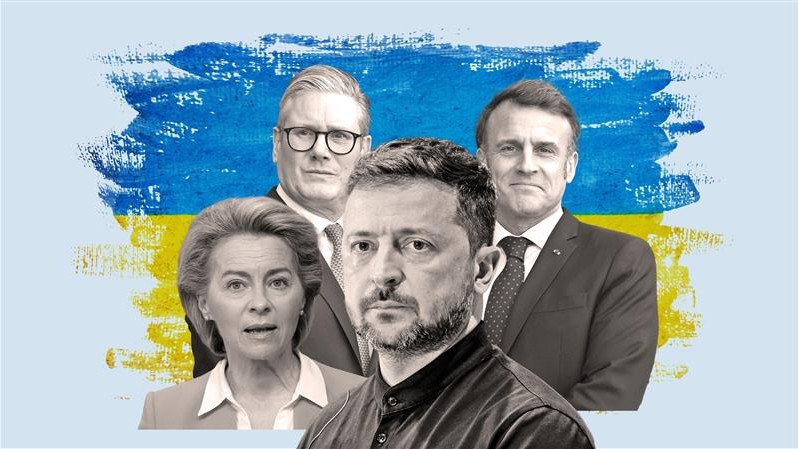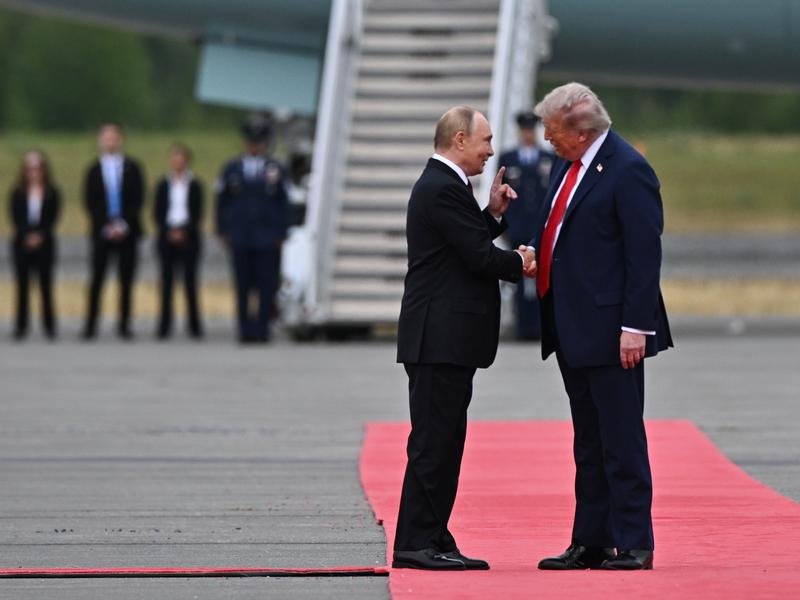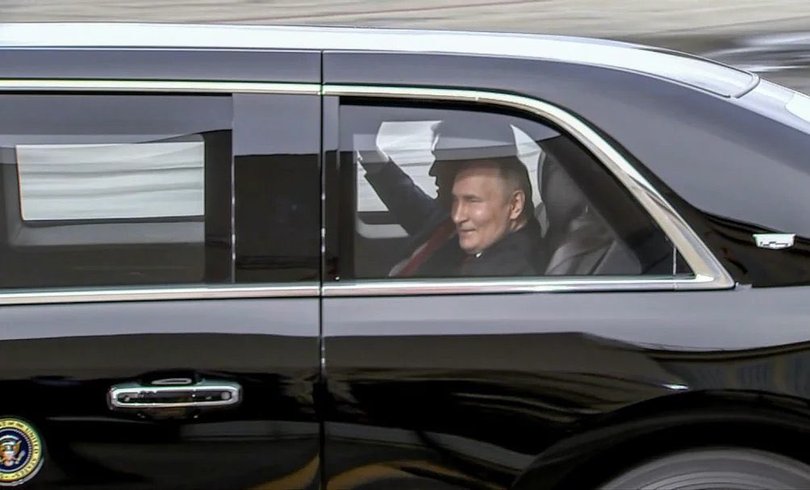LATIKA M BOURKE: European leaders must steer Donald Trump back on track for Ukraine after Vladimir Putin coup
LATIKA M BOURKE: Volodymyr Zelensky will go to the White House with plenty of cards on Monday, as he faces a critical task in the wake of the Alaskan summit that tilted in Vladimir Putin’s favour.

Volodymyr Zelensky will go to the White House with plenty of cards on Monday.
He will arrive with a suite of European leaders and, most notably, the promise of a “Multinational Force Ukraine” backed by the Coalition of the Willing, including possibly Australia.
Mr Trump will meet first with Zelensky in the Oval Office, where he was infamously dressed down on live television. He will need to avoid a repeat of that scenario at all costs.
Sign up to The Nightly's newsletters.
Get the first look at the digital newspaper, curated daily stories and breaking headlines delivered to your inbox.
By continuing you agree to our Terms and Privacy Policy.Later, Mr Zelensky’s Eurosquad, comprising NATO boss Mark Rutte, UK Prime Minister Keir Starmer, European Commission President Ursula von der Leyen, Finnish President Alexander Stubb, Italian Prime Minister Georgia Meloni and France’s President Emmanuel Macron will back the Ukrainian leader up in a meeting with Mr Trump in the East Room.
The European leaders have a critical task.
They must steer US President Donald Trump back on track after the weekend’s coup for Russian President Vladimir Putin.
The Alaska summit went Mr Putin’s way.
If it was the first step on the precarious journey to a Trump-brokered peace in Ukraine, it was a giant misstep from the US President.
Mr Trump appeared like a nervous bride on the red carpet, clapping as he waited for the Russian President to land on US soil.

He took Mr Putin with him in the Beast for a private chat to their official talks.
This was a reckless moment and underlined once and for all that, for MAGA, Mr Putin is someone to be feted.

Mr Trump does not see a man who has broken international law by invading another country, an indicted war criminal and oversees an army that steals children, tortures prisoners of war and conducts massacres.
He would rather tear strips off wartime leader Volodymyr Zelensky for not wearing a suit and being grateful enough, than get tough with the Russians and make good on his threats to Mr Putin that he should end the war or else.
The images of a gleeful leader of the Western world awaiting the Russian leader, combined with the photographs of US soldiers kneeling at the foot of Mr Putin’s plane to lay the red carpet, will haunt the Trump Administration.
And they serve as a further illustration of the cleavage of the United States from its traditional allies that is taking place. Mr Trump is a man who is turning his back on the West, whom he punishes with trade tariffs, yet is simultaneously eager to trade with a man who is the architect of the mass killing of Ukrainians and annoyed that that brutality is getting in the way of making cash.
Alaska was ultimately a show of US subservience to a man, by Mr Trump’s own words, who talks nice on the phone, hangs up and “bombs nursing homes.”
Mr Trump eroded his red line of demanding an immediate ceasefire to end the killing that he says horrifies him, and Mr Putin said the US had accepted that it was now on Europe and Ukraine to progress peace.
This may look on the surface like passing the buck, but in reality is an attempt to present Ukraine with a take-it-or-leave-it peace in order to blame any failure for it’s demise on Mr Zelensky rather than the Russian aggressor, as Trump posted on his social media site Truth Social late on Sunday.
“President Zelenskyy of Ukraine can end the war with Russia almost immediately, if he wants to, or he can continue to fight,” Mr Trump said.
“Remember how it started.
“No getting back Obama given Crimea (12 years ago, without a shot being fired!), and NO GOING INTO NATO BY UKRAINE.
“Some things never change!!!”
Mr Trump says he wants to negotiate a full peace agreement instead. But a ceasefire is ideal to provide the political space for those negotiations to take place.
Seeking to justify this inexplicable chickening out, Mr Trump’s special envoy Steve Witkoff boasted on CNN that the US had obtained Mr Putin’s “game-changing” backing for an “Article 5 protection” from the United States and a legal promise that he wouldn’t attack again.
“We didn’t think that we were anywhere close to agreeing to Article 5 protection from the United States, legislative enshrinement within the Russian Federation not to go after any other territory when the peace deal is codified, legislative enshrinement in the Russian Federation not to go after any other European countries and violate their sovereignty,” Mr Witkoff said.
It is beyond comprehension that the United States is willing to believe that a law passed by a dictator who routinely lies to the international community, breaks international law and meddles in our democracies means anything.
No wonder Mr Trump admires Mr Putin so much — the US President could only dream of being able to outfox a great power leader so easily. Mr Trump’s acquiescence is as alarming as it is dangerous.
In these negotiations, Russia is likely to obtain a chunk of Ukrainian territory, although probably not as much as Mr Putin would like.
“Peace must be lasting,” Mr Zelensky said upon his arrival in DC.
“Not like it was years ago, when Ukraine was forced to give up Crimea and part of our East—part of Donbas—and Putin simply used it as a springboard for a new attack.
“Or when Ukraine was given so called ‘security guarantees’ in 1994, but they didn’t work.”
There is almost no talk from Mr Trump and the White House of punishing the Russian leader for his illegal invasion. Rather, he looks set to get off scot free and start normalising economic ties with Mr Trump’s MAGA Administration.
Which makes Monday’s meeting paramount. It is a precursor to a potential trilateral between Mr Trump, Mr Putin and Mr Zelensky.
What is critical on Monday is for Europe and the White House to thrash out what type of security guarantee the US and Europe can offer Kyiv. Last week and before he met Mr Putin, Mr Trump told European leaders three times that he would offer a US security guarantee for Ukraine.
He repeated it subsequently to his meeting with Mr Putin.
Mr Trump will look the Eurosquad leaders in the eye on Monday when they assemble in the Oval Office to make good on that guarantee.
Overnight, UK Prime Minister Keir Starmer and French President Emmanuel Macron held a call involving the leaders of the Coalition of the Willing, including Prime Minister Anthony Albanese.
Asked on Monday if Australia would commit troops, the Mr Albanese said: “Not to fight.”
“If there is a peace and if there is a global response to that in the form of peacekeeping, then we would consider any proposal at the time,” he said.
“That would be a matter for the Cabinet.”
“Australia remains committed to supporting Ukraine and it was an opportunity to discuss next steps in achieving a just and enduring peace,” he said.
It will soon be vital to know who and what will make up the so-called Reassurance Force, given that the US could greenlight Russian imperialism by rewarding Putin’s invasion and opening up new economic ties.
“If we are weak with Russia today, we will be preparing for tomorrow’s conflicts,” President Macron said, upon his arrival in Washington.
“So, no weakness.
“We want a robust peace, a peace that would in no way be a capitulation, a peace that can in no way come at the expense of the security of Europeans.”
Unfortunately for Macron, it is Europe’s incapability to arm and defend Ukraine when it could have made a difference, in late 2022, that leaves the continent at the mercy of an outmatched Trump.
It is humiliating. And it is why their greatest shot remains manoeuvring the mercurial, doltish Trump Administration onto a course that allows the Americans to bag their precious trade with Russia whilst also extending a form of collective defence to Ukraine.

